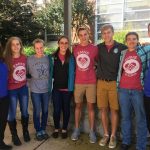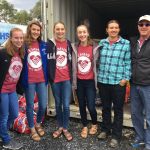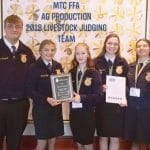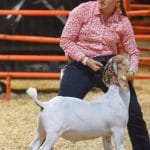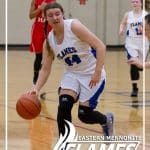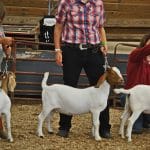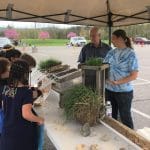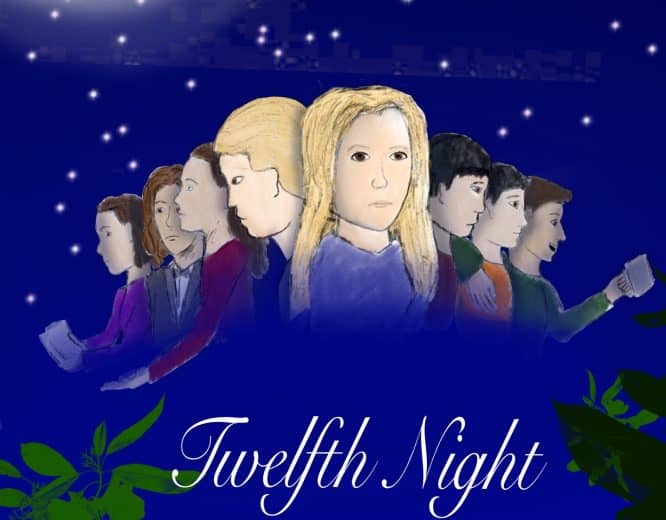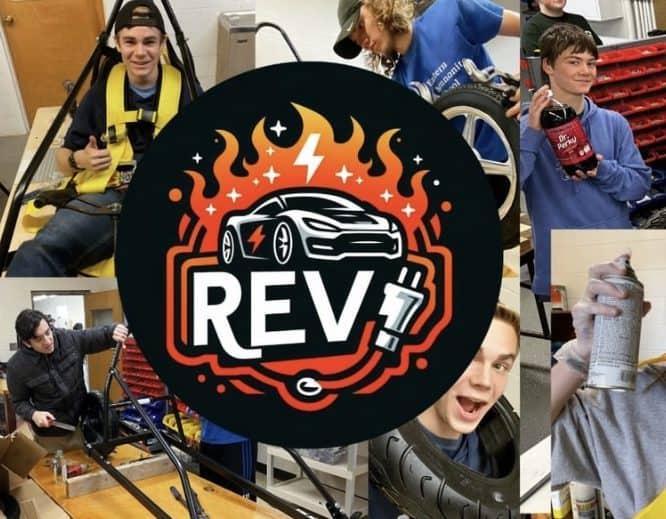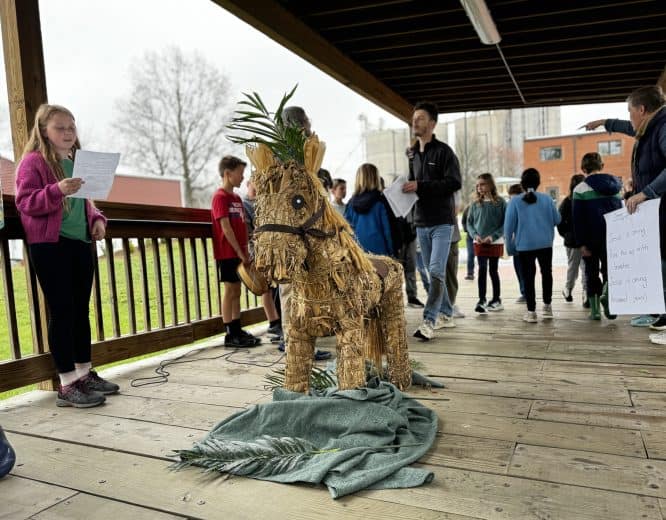Agriculture Production Program Ignites Passion for Conservation
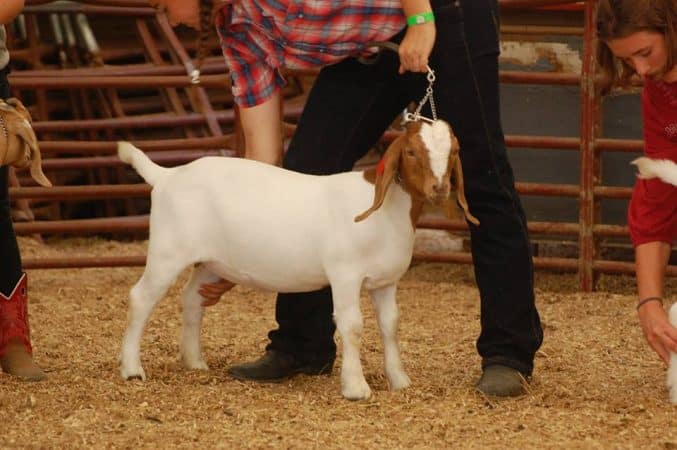
Editor’s note: Felicity Zimmerman ’19 wrote the following article for the Forage and Grassland Council publication, Forager. In addition to her experience with Massanutten Technical Center, Felicity is an active member of the EMS community where she runs track, plays basketball, is part of the We Serve club, and is a member of the Envirothon team.
My junior year of high school began like any other school year. My days were spent going from class to class, waiting eagerly for the final bell to ring announcing I was free. I was not interested in most of my classes, was not planning to go to college and was unsure what I wanted to do after high school.
In the midst of my uncertainty, I knew that I was interested in agriculture. Even though I live in a subdivision, I work at Farm Choice and have been involved in vegetable production and backyard poultry since elementary school. I had heard about a new Agricultural Production program beginning at Massanutten Technical Center, so I decided to join the class.
From my first day of class, I knew it was going to be a great experience. Rather than sitting in desks, we spent our class at Valley View Farm converting an old poultry house into a barn. That first day, we built gates to make pens for goats, sheep, and pigs that would soon arrive on the farm. Later that week, we harvested pumpkins.
Being to able sell to to utilize the local and manage community. a farm on a daily basis has allowed us to experience things not possible in a traditional classroom. The curriculum integrates farm work such as shearing sheep, trimming goat hooves, or simply cleaning the barn with book work. Occasionally, an unfortunate moment creates a lesson that even the best instructor could not. One day, for example a heifer found its head stuck in the gate. We immediately began calmly working to free it from its bondage, and with teamwork, and a little sweat, eventually succeeded.
Outside of class, I have had many opportunities to further develop my skills and knowledge. Only a few months into the class, I went on a trip to the North American International Livestock Exposition in Louisville, Kentucky. This was the first time watched livestock shows outside of our county fair. I saw livestock of very high quality, an amazing trade show, and began to think about showing myself. The idea intrigued me, but also scared me. I had never owned livestock, yet alone set foot in a show ring. With time running out, I decided to buy two wethers and give it a try.
Of all the species, goats are by far my favorite, though having goats has not always been easy. Every morning, May through August, I drove five minutes up the road to my grandparents to feed my goats before
school, continuing through the summer months. In the evenings I returned to feed the goats once again and
worked to halter break them. At first, I was very patient with the goats, but the constant tugging and tail lifting quickly got old. I tried coaxing with tree leaves, treats, encouraging words and many other tactics, all which were to no avail. Just when I thought the goats were finally broke, the barking of a neighboring dog caused them to bolt, or they laid down, refusing to budge.
In what seemed like no time, it was fair time. The goats were walking better, and I felt a sense of accomplishment. When show day arrived, I washed the goats one last time, touched up the previous day’s clipping and waited on the bleachers for my showmanship class to be called. Finally, after what seemed like years, I entered the ring. My excitement soon turned to embarrassment; I had tried so hard, yet my goat still would not walk in the ring. As one can imagine, I was not pulled from my showmanship class. I felt defeated. Soon, defeat was erased with pleasant surprise as one of my wethers placed second in a very competitive market class. The week came to a close, with both wethers being sold for way above market price.
I sat in my desk listening to syllabi after syllabi the following week, the laughter, friendships, and excitement of the week before felt distant. Only the exhaustion of the previous week lingered. Although I was not excited to return to school, I had much to look forward to. I was attending state fair and showing pigs in October, as well attending the National FFA Convention for the first time. Not only would I be attending convention, but competing in livestock judging as well.
Several months before, I began livestock judging. On the first day of judging practice, I sat in a classroom, tired from school and track practice, and took notes on various PowerPoints. The monotonous PowerPoints and unfamiliar terminology of livestock judging made me question why I had ever decided to compete. This soon changed as we began using what we had learned to judge pictures, videos and eventually life animals. At first, I did little more than stare at the animals, writing down what others said and unable to see much difference myself, but soon, it all began to come together. I was able to find differences, place the animals, and began to write simple sets of reasons. By the state contest, we had come a long way, but I was still shocked when after the first day, we were one of five teams who made the second day. We were fortunate enough to win the state contest and had the opportunity to compete at nationals.
On the way out to Indianapolis, we attended practice competitions including collegiate participants, went up in the St. Louis Arch and visited General Grant’s Farm. While at the National FFA Convention, we attended a Garth Brooks Concert, visited booths of colleges and employers, and saw president Donald Trump speak. We placed fourteenth overall, fifth in team problem, and received gold rating as a team.
Over the past three semesters, I have learned about various topics including marketing, livestock health and nutrition, grass identification, soil science,, meats, equipment, breeds, and woodworking, The financial management that goes into farming, such as enterprise budgets, filling out tax forms, basic accounting, ·balance sheets, and income statements has also been a central aspect of our program. The decision making, team work, creativity, new skills, confidence, independence and hard work ethic are valuable assets learned on the farm that cannot be learned from a textbook, yet are so crucial to success in the workforce.These types of experiences have not only helped to prepare me for my future, but also become a more valuable employee in my current position at Farm Choice.
My experiences in class and showing at the county fair fueled a desire to begin my own goat herd. This fall, I bought four does and am looking forward to breeding and selling boer goats for carcass quality in addition to show ring success. I also did an internship with the Shenandoah Valley Soil and Water Conservation District as a part of Massanutten Technical Center’s co-op program. I spent every other afternoon there for a semester helping with tasks including mailings, making copies, filing, and shredding. I also got to learn a little bit about prorating, using GIS and tracking, going on site visits, and build relationships with SWCD and NRCS employees. I gained an interest in conservation work through participating in Envirothon during my high school years, and after interning at the SWCD, I plan to obtain a degree in a related field and pursue a career in conservation. However, I am confident that wherever my future leads, the on-farm experience I gained in this program, as well as the relationships I have built, will help me in my future career.


